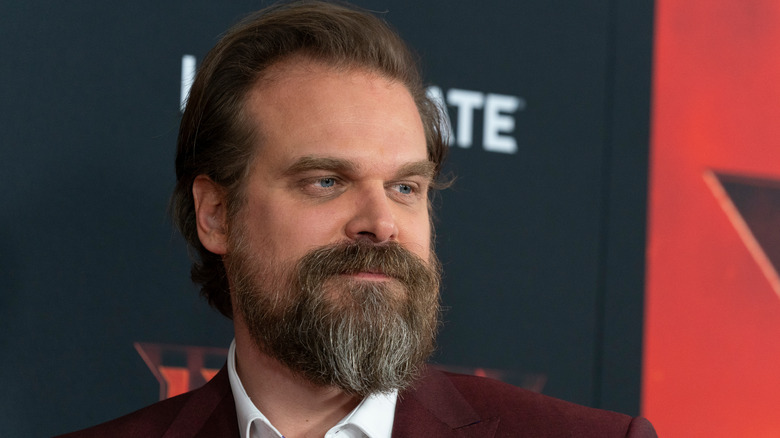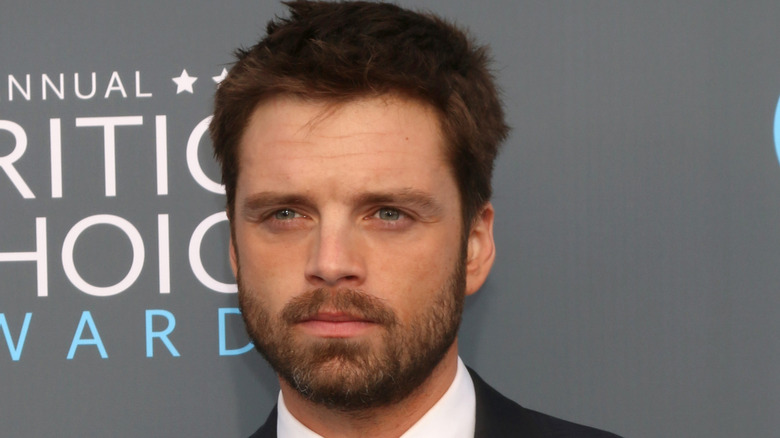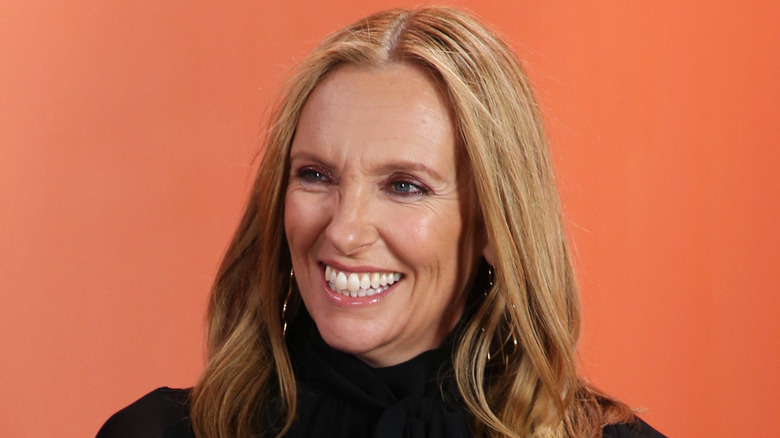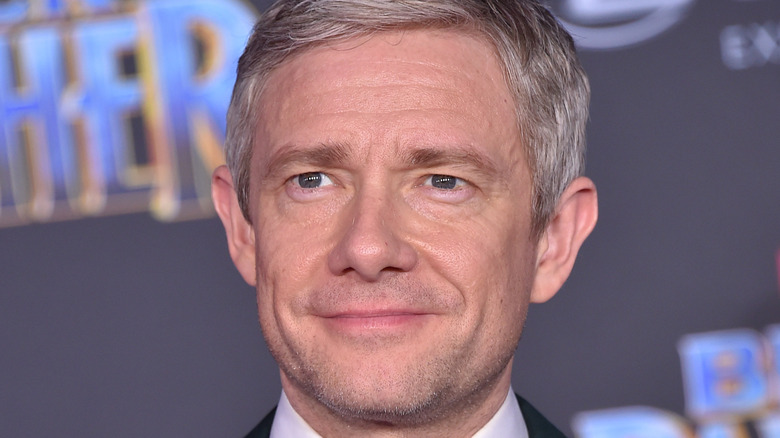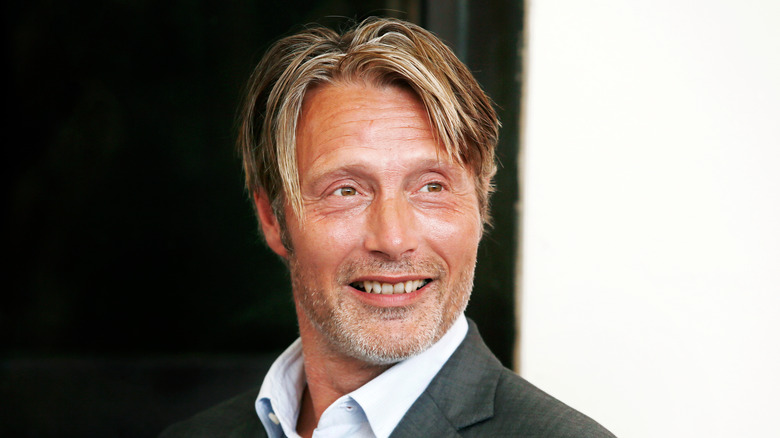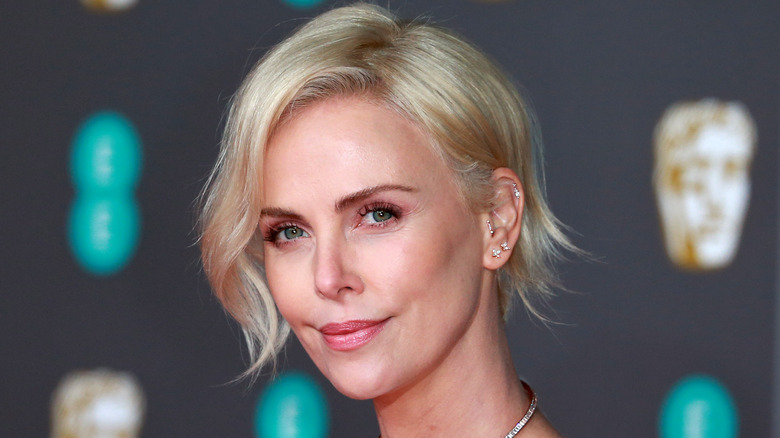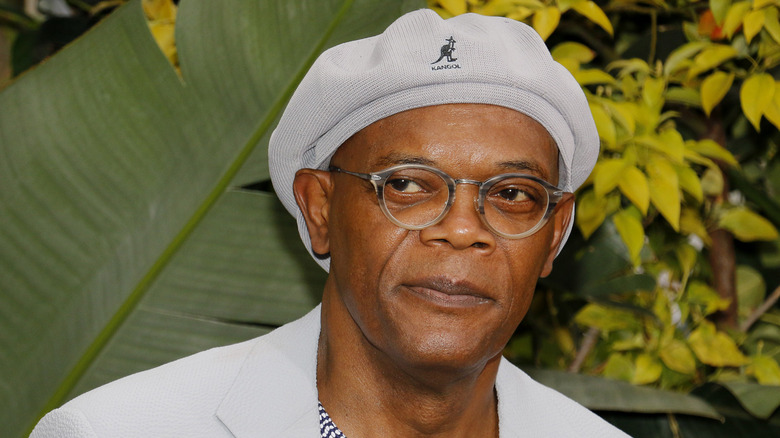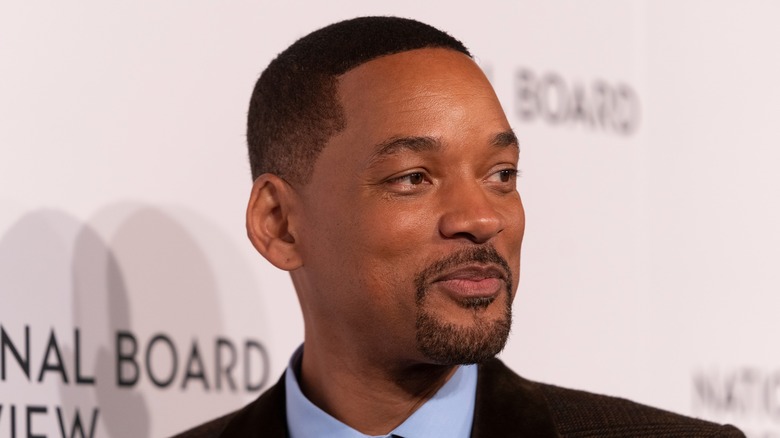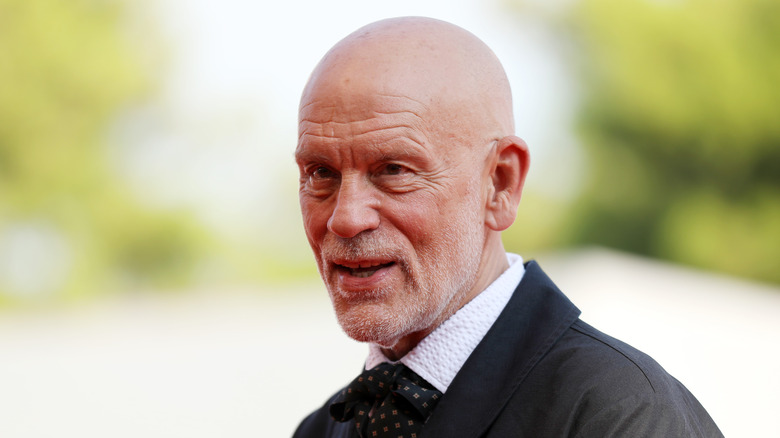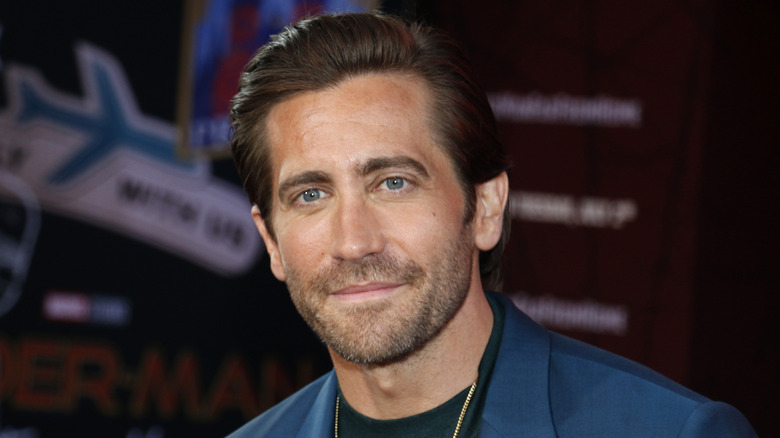Actors You'll Never See Method Acting
There are many kinds of actors in Hollywood, and they all bring something different to their roles. Some excel at playing characters that are quiet and introspective, others prefer to play it loud and ridiculous, and others just have that indefinable "it factor" that makes them bona fide movie stars, able to command the screen through sheer presence alone. Everyone's approach to their work is different, and depending on the role, it may call for varying degrees of dedication. One of the most controversial modes of performance is known as Method acting (credited to wildly influential acting coach Lee Strasberg), which prizes authenticity and suggests that actors must use their physical, mental, and emotional self in the creation of a character, as well as drawing from personal experience to make moments feel as real as possible.
In the modern era of filmmaking, a number of actors have started taking this approach to the extreme. It has become increasingly popular for performers to define Method as never breaking character on set, which has resulted in a number of on-set altercations and frustrations for the cast and crew around them. Though stars like Daniel Day-Lewis, Christian Bale, and Jared Leto have found considerable success and even won Oscars for their commitment to the craft, not all of their peers view these techniques as something worth trying. Here are actors who have publicly spoken out against the idea of Method acting.
David Harbour
After spending years playing minor roles in films like "Quantum of Solace" and "The Green Hornet," David Harbour broke into the mainstream in a big way with his role as Sherriff Jim Hopper in Netflix's "Stranger Things." Since then, Harbour has parlayed his newfound celebrity into a number of high-profile projects. He joined the Marvel Cinematic Universe in 2021 when he played the Russian superhero Red Guardian in "Black Widow," and even took on the title role in 2019's "Hellboy" reboot. He's also no stranger to changing his body for a role: to prepare for the fourth season of "Stranger Things," the actor shed around 80 pounds to coincide with his character's dramatic weight loss, though he has since voiced regrets about that process.
Despite his commitment to his characters, Harbour is no fan of Method acting. In an interview with GQ, he jokingly discussed applying the Method to an early stage role as Macbeth: "When I was younger — it's so embarrassing — but I remember playing that famous Scottish King, and being like, 'I'm gonna kill a cat' or something: 'I'm gonna go murder something to know what it feels like to murder.' I didn't actually do it, obviously. Not only is that stuff silly, it's dangerous, and it actually doesn't produce good work." He even cites Daniel Day-Lewis, perhaps the most famous practitioner of the technique, saying that "he's an extraordinary actor who I'm captivated and fascinated by. [But] when he explains his process it sounds like nonsense to me."
Sebastian Stan
This young heartthrob has come a long way from his days on "Gossip Girl." Despite his early career mostly trading in roles similar to what he played in that teen drama, Sebastian Stan quickly become most closely associated with the character of Bucky Barnes, aka the Winter Soldier, in the Marvel Cinematic Universe. As of 2022, Stan has played the role in a half dozen films, not to mention getting upgraded to co-lead for the Disney+ mini-series "The Falcon and the Winter Soldier." In addition to his time as the antihero, Stan has also pursued a variety of more dramatic work, with memorable turns in films like "I, Tonya" and "Fresh."
While he's certainly not opposed to bulking up for his time as Bucky, Stan draws the line at Method acting, and he didn't mince words when discussing the technique on the actor's podcast, "In the Envelope": "I don't believe in creating chaos for the purposes of (acting). And I know actors do that a lot. There's a lot of people that do that ... create sort of chaos on set or chaos in the other people they're working with, in order to somehow give the scene this tension or whatever." He made his feelings clearer when he went on to say that "to me, that just reads like a very irresponsible, narcissistic, kind of self-indulgent thing. It just reads like: I'm afraid, and I just want to torture everyone else because of it."
Toni Collette
Australian wunderkind Toni Collette has no one that she needs to prove her credentials to. Since making her debut in 1991's "The Efficiency Expert," the actress has impressed audiences and critics alike with her range and versatility. Whether it's showcasing her comedic chops in humorous films like "About a Boy" and "Little Miss Sunshine," or making her mark on the horror genre with captivating performances in "Hereditary" and "The Sixth Sense," Collette's presence is always guaranteed to be a net positive for whatever project she attaches herself to.
She may be happy to experiment and try new things throughout her career, but Collette has no respect for the Method. In an interview with David Poland, where she discussed the highs and lows of her time as an actress, she made her thoughts on the technique quite plain: "I'm in no way method, whatever that means. I think that is actually total bulls***. I mean it's utter wankery. I don't understand why people either try to sell the idea that they do that, or convince themselves that they do that — I mean, everyone has their own process, but I'm much more instinctive." While it's a natural part of the process for actors to take a part of the characters with them, she is clearly against overdoing it.
Martin Freeman
It feels like forever ago that this quirky British thespian was best known for playing Tim in the original version of "The Office." In the years since, Martin Freeman has firmly established himself as a compelling screen presence. He has brought a number of infamous literary characters to life, including Arthur Dent in "The Hitchhiker's Guide to the Galaxy," Bilbo Baggins in the "Hobbit" trilogy, and a modern interpretation of Dr. John Watson in BBC's "Sherlock." He has even found a place in the MCU via the role of CIA operative Everett Ross, which he has played in both "Captain America: Civil War" and the "Black Panther" films.
For all of his work in both film and TV over the years, one area of performance Freeman seems uninterested in trying is with Method acting. Speaking on the "Off Menu" podcast, and specifically referring to Jim Carrey's work in "Man on the Moon" (which was highlighted in greater detail for the documentary "Jim and Andy"), Freeman described it as "a highly impractical way of working, which is why I think it belongs more to the student and academic side than the practical ability side." He expands on this by saying that "you need to keep grounded in reality, and that's not to say you don't lose yourself in the time between 'action' and 'cut', but I think the rest of it is absolute pretentious nonsense and highly amateurish. It is not professional. Get the job done, do your work."
Mads Mikkelsen
Danish actor Mads Mikkelsen is one of the most internationally beloved stars working today, both in spite of and likely because of the impressive number of villainous roles he can list on his resume. From a poker-playing arms dealer in "Casino Royale," to the flesh-eating psychiatrist of "Hannibal," to a pair of magic-wielding zealots in both "Doctor Strange" and "Fantastic Beasts: The Secrets of Dumbledore," there are seemingly no limits to the amount of menace that Mikkelsen can portray onscreen. Nefariousness is hardly the only string to this actor's bow, however, as he also learned French for a role in "Age of Uprising" and how to swordfight and ride a horse for his English-language debut in "King Arthur."
Though applauded by many that he's worked with for his dedication, he has also made his thoughts on Method acting incredibly clear, dismissing the whole thing as "bulls***" and "pretentious." He elaborated in an interview with GQ UK when he spoke about the dangers of committing too much to a project: "What if it's a s*** film — what do you think you achieved? Am I impressed that you didn't drop character? You should have dropped it from the beginning! How do you prepare for a serial killer? You gonna spend two years checking it out?"
Robert Pattinson
Adored by fans and unfairly dismissed by critics for his early work as Edward Cullen in the "Twilight" franchise, Robert Pattinson has spent a long time distancing himself from the initial perception that he was little more than a pretty face. Rather than immediately jumping into another franchise or coasting on undemanding romantic dramedies, Pattinson sought out the most eclectic roles he could find. He made a point to work with visionary filmmakers who were more concerned with creating art than box office success. This led to acclaimed performances in everything from David Cronenberg's "Cosmopolis," to the Safdie Brothers' "Good Time," to Robert Eggers' "The Lighthouse," and many more. This journey eventually brought him back to the mainstream when he teamed with director Matt Reeves on a reinvention of "The Batman."
Thanks to the wide range of talent Pattinson surrounded himself with, there's no doubt he learned a lot about his craft. One thing he did not take to heart, however, was Method acting. He discussed as much with Jennifer Lopez for Variety's Actors on Actors series, and joked that "you only ever see people do the method when they're playing an a–hole. You never see someone being lovely to everyone while they're really deep in character." For himself, Pattinson notes that "I need to know it ends. I need to know there's a cut coming, and then I'll feel safe. If it just feels like you can't get out, that's when you go crazy."
Charlize Theron
Before she became one of the most popular action stars in the world thanks to badass performances in films like "Mad Max: Fury Road," "Atomic Blonde," "The Old Guard," and the "Fast & Furious" saga, Charlize Theron was best known for her Oscar-winning portrayal of convicted serial killer Aileen Wurnos in 2003's "Monster." It still feels unbelievable that the stunningly beautiful Theron was able to transform herself so thoroughly for the role, yet according to an interview with Oprah, it really only involved less than an hour of makeup and gaining 30 pounds over the holidays. Still, with such an unrecognizable performance defining so much of her career, one would think that the actress would be all in favor of going Method.
Evidently not, based on what she had to say to the Los Angeles Times while promoting the movie "Bombshell." By her own admission, Theron did experiment with Method acting earlier on in her filmography, although not for the project that audiences might assume. As she puts it, "I can't do the Method thing. I did it once, for 'Devil's Advocate,' and I was just exhausted. It was really hard to go to those deep, dark places because I was so tired. It was good for me to figure this out, and I am much better now at understanding and living and breathing in the moment with the character."
Samuel L. Jackson
Few actors have anywhere near the enduring popularity and sheer volume of work of Samuel L. Jackson. With almost 200 acting credits on IMDb, the man has rarely stopped working since making his film debut in 1972's "Together for Days." Between his many repeat collaborations with directors like Spike Lee and Quentin Tarantino, and his memorable contributions in both the "Star Wars" prequels and the Marvel Cinematic Universe, Jackson has crafted an aggressively entertaining persona that has delighted audiences around the world for decades.
Never one to avoid speaking his mind, Jackson did briefly touch on the subject of Method acting and why it's ultimately not for him. Speaking to Collider while promoting "The Last Days of Ptolemy Grey," he described his process of preparing for a role: "I've done all that stuff before I get to work. I know the emotional place that I need to go to, to get something done. Sometimes it takes other people longer to get there." As far as how Method acting affects the workplace, he says that "sometimes, when you're working with people who invest like that, it doesn't feel like they're having a good time, to me. It's a job of playing make-believe. You do it effectively and you do it in a way that's not harmful to you because it's a safe space. You're supposed to be able to safely come into this space, work and give emotionally, and not be harmed by it."
Will Smith
From hip-hop artist to sitcom star to blockbuster leading man to Academy Award winner, Will Smith has experienced many highs and lows over the span of 30+ years in the entertainment industry. After establishing a goofy and likable personality on "The Fresh Prince of Bel-Air," but before he proved himself a box office draw and a highly capable action star with the likes of "Bad Boys" and "Independence Day," Smith took his first shot at a more dramatic role when he starring alongside Stockard Channing and Donald Sutherland in "Six Degrees of Separation."
The film was notable for being Smith's first and last brush with the idea of Method acting, which he relayed during an interview with Esquire. "With 'Six Degrees of Separation,' I got a taste early of the dangers of going too far for a character. My character was in love with Stockard Channing's character. And I actually fell in love with Stockard Channing," Smith recalled. "So the movie was over and I went home, and I was dying to see Stockard. I was like, 'Oh no! What have I done?' That was my last experience with Method acting, where you're reprogramming your mind. You're actually playing around with your psychology. You teach yourself to like things and to dislike things. It is a really dangerous place when you get good at it. But once I had that experience, I was like, no more Method acting."
John Malkovich
There are a great number of actors who have played themselves on film, either to poke fun at their public persona (a la Keanu Reeves in "Always Be My Maybe") or to add a layer of meta-textual dissonance (a la Julia Roberts in "Ocean's Twelve"). Not many can say that they've played themselves in a movie that was written and conceived around the concept not only them playing themselves, but other people taking turns to play them as well. Yet that's exactly what John Malkovich pulled off as he became both a victim and a vessel at the center of Spike Jonze and Charlie Kaufman's "Being John Malkovich," which allowed the actor to skewer himself while still clearly having plenty of fun on screen.
Between heady explorations of art, deeply serious period pieces, screwball comedies, and everything else that makes up Malkovich's eclectic career, one would think he'd find ways to be deeply invested in his roles. But apparently he finds little use for going Method, as he discussed in a 1984 interview with the late Roger Ebert: "I'm not a Method actor. I don't believe acting should be psychodrama. I look within myself and see what I can find to play the role with. If I'm playing a blind man, I don't go around blindfolded for days. A lot of good actors would, but I don't go in for that very much. I like to just make it up as I go along."
Claire Danes
After breaking out at a young age with performances in the teen drama "My So-Called Life" and Baz Luhrmann's postmodern riff on "Romeo + Juliet," it would have been easy for Claire Danes to disappear into the sea of talented young actresses who get swallowed up and spat out by the Hollywood system. Fortunately, after a string of undemanding film roles (including "Terminator 3: Rise of the Machines" and "Stardust") seemed to suggest such a trajectory, Danes set her sights on the new wave of prestige TV in the early 2010s. First in the Emmy-winning TV movie "Temple Grandin," then as the lead of Showtime's wildly successful "Homeland," the actress properly re-established herself as someone who chose her projects carefully and gave each one her all.
With such dedication and focus, it may surprise some to learn that she finds no benefit in being a Method actor. At the 2012 Television Critics Association tour, she indicated as much by saying "if I took my characters home with me, half my life would be misery, I think. I tend to compartmentalize work from my life. I'm not terribly Method. The acting isn't easy, but I have figured out how to let it go, and that was hard-earned, actually. That took some time to work out. As a kid, I was much more superstitious and earnest and fearful and thought I had to sacrifice my happiness in the most extreme way. I realize now it's a discipline; it's a job."
Jake Gyllenhaal
Jake Gyllenhaal has come a long way from being an adorable little kid in the likes of "City Slickers" and "October Sky." There was a time in his career when, for every critically acclaimed project he would participate in (such as Ang Lee's "Brokeback Mountain" or David Fincher's "Zodiac"), there were just as many that were equally maligned (like "The Day After Tomorrow" and "Prince of Persia: The Sands of Time"). Despite always committing himself mentally and physically to his work, it was when he lost 30 pounds to play the near-skeletal Louis Bloom in 2014's "Nightcrawler" that he seemed to fully emerge one of the most exciting actors working today.
Much was made about the intense dedication and weight loss that Gyllenhaal brought to the role, but to hear him say it, going Method had nothing to do with his approach. In a monologue for when he hosted "SNL" the second time, the actor described his process: "Honestly, I wasn't even that good at Method acting ... I realized something I should have realized a long time ago — acting is a really stupid job. It's pretend! And it's fun, and it should be filled with joy." He expanded on this in an interview with the Evening Standard, saying that "some actors have asked me, 'Hey, I know when you get into something you do a lot of preparation — I'm doing this role, do you think I should go and jump off a building?' I'm like, 'No! Use your imagination!'"

